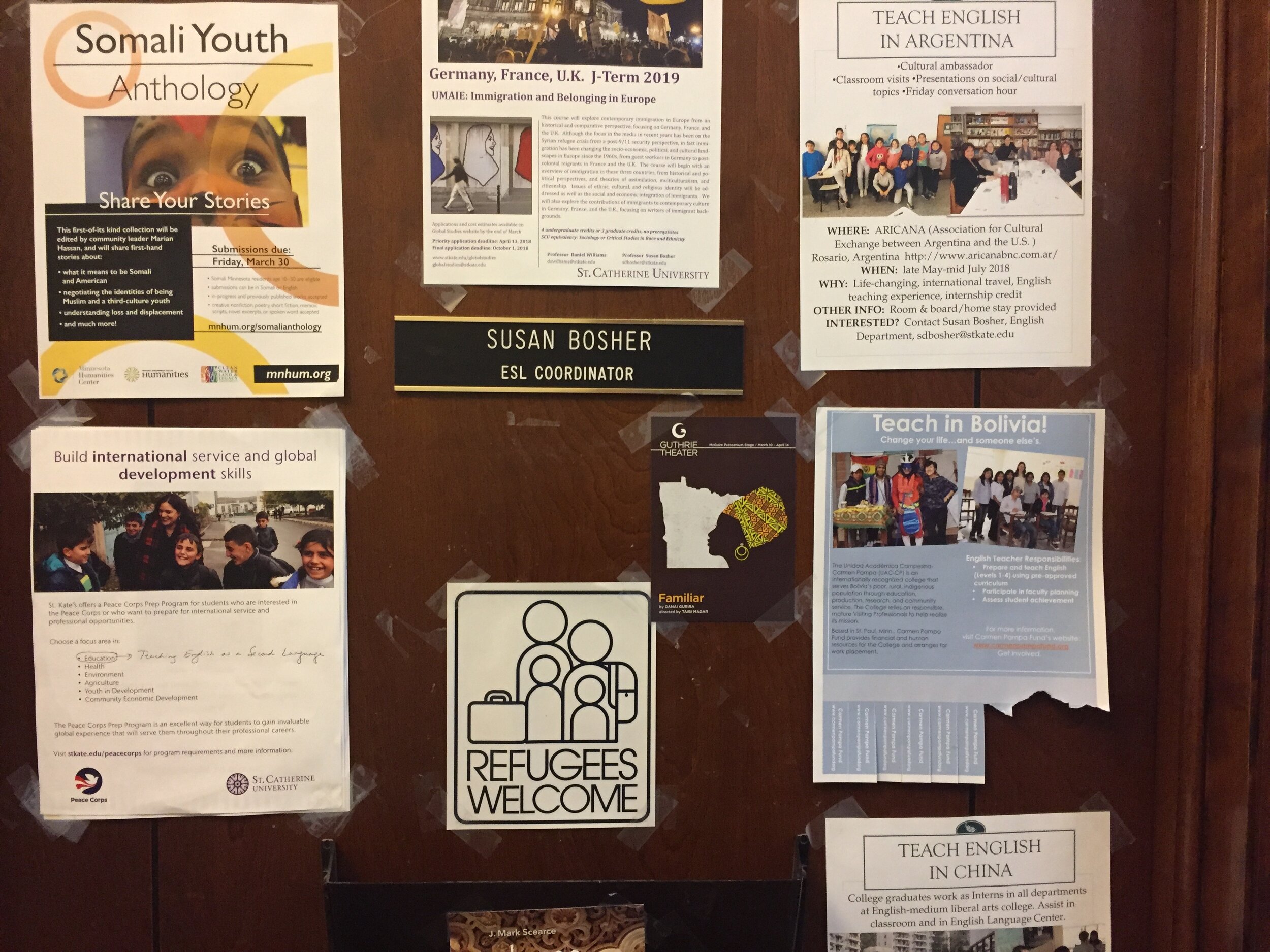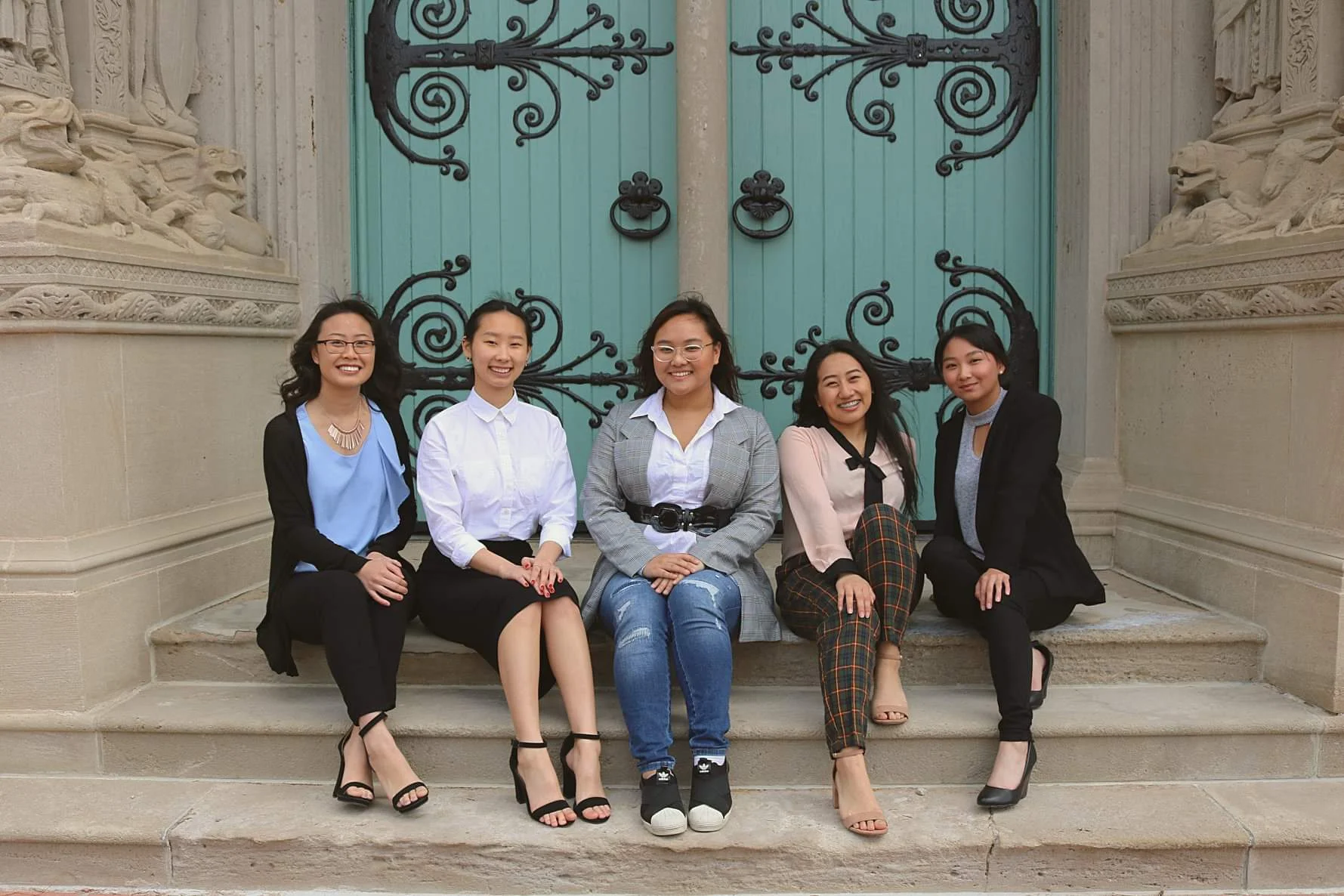St. Kate’s leads in initiative for international work
St. Kate’s will be the first college or university in Minnesota to institute a Peace Corps Prep program, joining the list of a score of other universities in the country that aim to prepare their students for international work.
Committee members at St. Kate’s completed two different proposals for a Peace Corps Prep program (PCPP) to be based here. The second, revised proposal was accepted and the program is now officially started at St. Kate’s.
For the second proposal, a few students also sent in letters of support on behalf of St. Kate’s. Zaynab Abdi, student and leader of the group Influence, Lead, and Succeed, sent in a letter last November to the Peace Corps to support the faculty’s application. Her letter mentions the need for our group of young, diverse students at St. Kate’s to develop the leadership skills to help the places where they come from.
“Our communities are global—we have family and friends around the world, including impacted by the recent attack in Mogadishu, the DACA issue, and wars in countries like Yemen and Syria. We know that the connections created by Peace Corps and Peace Corps Prep help build global community. They also contribute to the development of women’s leadership abroad and development of communities and countries,” stated the letter. Caroline Krafft, the official coordinator for the program, believes that student support for the Peace Corps Prep Program is one of the factors that led to St. Kate’s being accepted as a host school.
The requirements for the PCPP have been developed intentionally to match what Peace Corps recruiters look for in people that work in international circumstances. There are six tracks students can choose to focus on: Education, Health, Environment, Agriculture, Youth in Development, and Community Economic Development. These tracks mirror the six sectors that Peace Corps volunteers work in during their 2 years of service.
Krafft commented, “Particularly, for Peace Corps, you’re usually leading a project or an initiative that the community has identified as being very important”.
Students who choose to apply to the program have to design a plan for completing all the parts of the certificate, and how their coursework will fit in with the requirements for their track.
St. Kate's students are now able to sign up for the Peace Corps Prep Program, which will help them develop skills for international work.
“There are different ways to fulfill all of those, you can choose a combination of classes, there are different ways you can serve as a leader, you can lead a student club, you can lead an event, organize an event...St. Kate’s students do awesome work already, so I think it’s a great way to recognize as well some of the work that students do,” said Krafft.
At the writing of this article, two students had officially signed up and been accepted to the program, but Krafft is expecting around fifteen students a year will participate.
Sophomore Kieu My Phi is one of the first students officially enrolled in the Peace Corps Prep Program, and was drawn by the program’s requirements and the fact that she wouldn’t have to take any additional classes on top of the ones she was already taking to be able to complete the certificate. My Phi says she would love to participate in the Peace Corps after graduation and work internationally as well. For the certificate, she will follow the Economic Development track, as she is pursuing a major in Public Policy. To fill the internship requirement for the PCPP certificate, she hopes to work with All God’s Children, an organization that creates public policy about orphanage and childcare institutions around the world.
“[PCPP] goes really well with the university’s mission of social justice and volunteerism… Knowing how to be globally aware is so vital and is tied down to St. Kate’s mission and it’s roots,” said My Phi.
Teaching English is often a component of volunteering with the Peace Corps. Teaching English as a Second Language is include in the Education track of the Peace Corps Prep Program.
Professor Susan Bosher, a member of the Program Committee for PCPP and the creator of the Teaching English as a Second Language minor at St.Kate’s, developed the Education track of the program. Through connections she had before with the Peace Corps, it was recommended that she propose a Prep Program at St. Kate’s.
The Peace Corps was started in 1961 and is U.S. government run service program that sends American volunteers to international communities and solve the challenges they face side by side community leaders. One of its founding goals was also to promote better understanding of Americans by sending volunteer representatives that would hopefully improve the thinking about America.
Bosher mentioned that over time, the Peace Corps has changed its methodology for sending volunteers from America overseas. “The model of Peace Corps has changed a lot over the years, so it’s not just people from here going over there saying ‘This is what I think you need, this is how I think you should do it’...To be a successful Peace Corps volunteer you really have to know the community, have the respect of the community, be willing to listen to the community and figure out a way to make something work using local resources.”
Bosher herself currently has a daughter serving in the Peace Corps in Morocco, who had to go through many months of training to prepare herself to serve in the community she’s in.
“A lot of the positions in Peace Corps either are about teaching English or they involve teaching English…
So for example, my older daughter is in the Peace Corps right now...So even though she did not want to just teach English, she wanted to do environmental work, it’s pretty common that you get asked to do something related to English teaching. So, she has taught a course in English for Environmental Studies,” said Bosher.
My Phi reflected, “Having the Peace Corps experience will help me with the international aspect… I’ll be more pushed to do it.”
Krafft encourages prospective program participants to take a look at the student guide on the St. Kate’s website: https://www.stkate.edu/academics/academic-enhancement/peace-corps-prep







